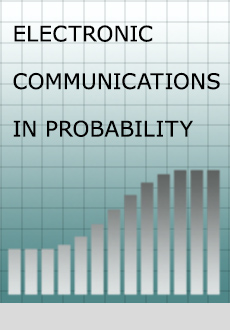Abstract
The classical skew-product decomposition of planar Brownian motionrepresents the process in polar coordinates as an autonomously Markovian radial part and an angular part that is an independent Brownian motion on the unit circle time-changed according to the radial part. Theorem 4 of L09 gives a broad generalization of this fact to a setting where there is a diffusion on a manifold $X$ with a distribution that is equivariant under the smooth action ofa Lie group $K$. Under appropriate conditions, there is a decomposition into an autonomously Markovian "radial" part that lives on the space of orbits of $K$ and an "angular" part that is an independent Brownian motion on the homogeneous space $K/M$, where $M$ is the isotropy subgroup of a point of $x$, that is time-changed with a time-change that is adapted to the filtration of the radial part. We present two apparent counterexamples to Theorem 4 of L09. In the first counterexample the angular part is not a time-change of any Brownian motionon $K/M$, whereas in the second counterexample the angular part is the time-change of a Brownian motion on $K/M$ but this Brownian motion is not independent of the radial part. In both of these examples $K/M$ has dimension $1$. The statement and proof of Theorem 4 in L09 remain valid when $K/M$ has dimension greater than $1$. Our examples raise the question of what conditions lead to the usual sort of skew-product decomposition when $K/M$ has dimension $1$ and what conditions lead to there being no decomposition at all or one in which the angular part is a time-changed Brownian motion but this Brownian motion is not independent of the radial part.
Citation
Steven Evans. Alexandru Hening. Eric Wayman. "When do skew-products exist?." Electron. Commun. Probab. 20 1 - 14, 2015. https://doi.org/10.1214/ECP.v20-4040
Information





